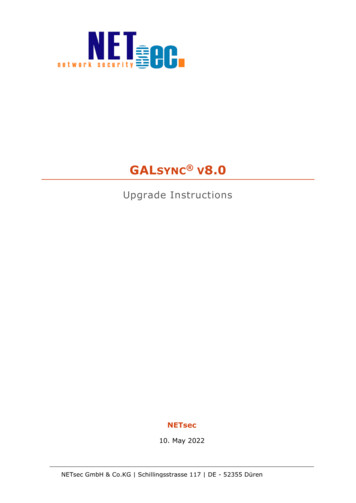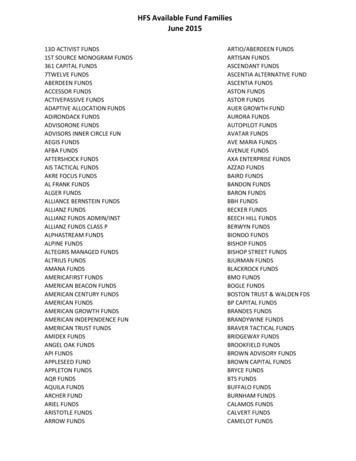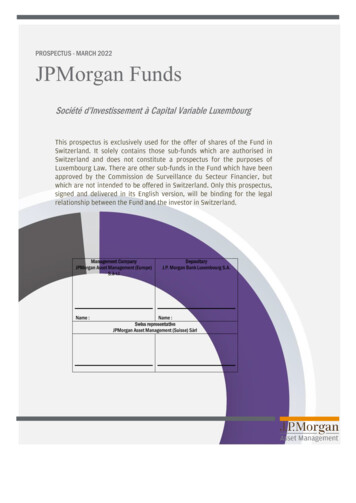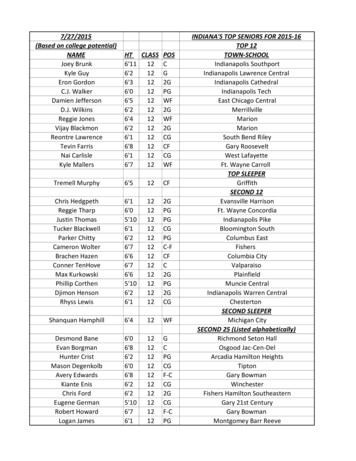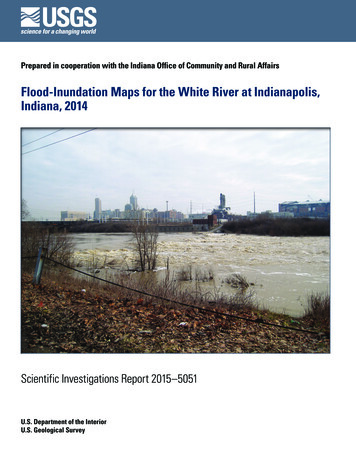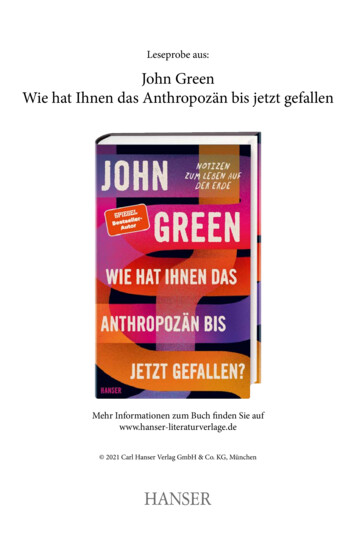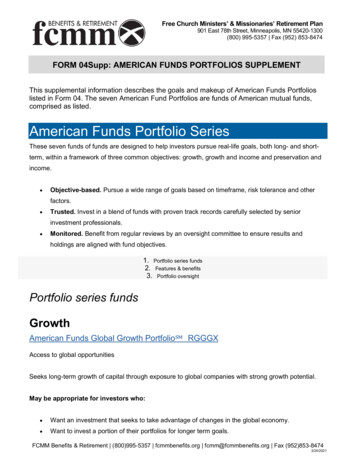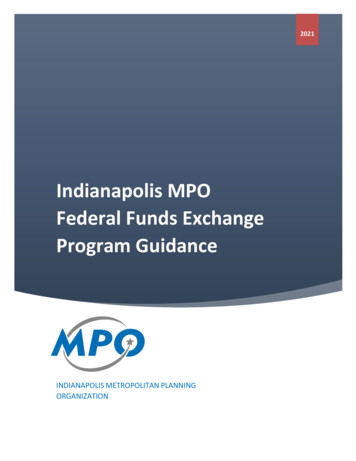
Transcription
2021Indianapolis MPOFederal Funds ExchangeProgram GuidanceINDIANAPOLIS METROPOLITAN PLANNINGORGANIZATION
This page intentionally left blank.2
ContentsAcronyms Used in this Document1. Introduction1.1Reason for document1.2Outline of document2. Program Development and Management2.1Metropolitan Transportation Plan and Congestion Management Process (CMP)2.2Policy guidelines2.3Air Quality Determination and Reporting Requirements2.4Approval process2.5Public involvement2.6Cost Savings3. Project Application Background Documentation4Project Selection4.1MiTIP4.2Submittal documents4.3Environmental review4.4Scoring process4.5Approval Process and Scope/Schedule Considerations5Project Development and Management5.1Overview5.2Grant agreement5.3Tracking and reporting5.4Project Development6Construction Letting and Award6.1The Letting Process6.2Shop Drawings and False Work-Review Procedure6.3Advertisement of the Contract for Bids6.4Contract Questions and Answers6.5Contract Revisions6.6Evaluation of Bids and Contract Award6.7Letting with Exceptions6.8IMPO Federal Fund Exchange Funds for Construction7Construction Process7.1Construction Inspection7.2Project Engineer/Supervisor (PE/S)7.3Preconstruction Conference7.4Construction Administration7.5Critical Elements7.6FATAL FLAWS8Payment Process8.1Construction Purchase Order8.2Advice-of-change8.3Final payout9Q&A10 155
This page intentionally left blank.4
Acronyms Used in this EPANTPPE/SPIPRFPROWRFQSEPATPCTTCUSDOTAmericans with Disabilities ActAsset Management PlanClean Air Act AmendmentsCommunity Crossings Matching GrantState Categorical ExemptionCall for ProjectsConstruction InspectionCongestion Management ProcessState Environmental AssessmentState Environmental Impact StatementEngineers Joint Contract Documents CommitteeFinal Construction RecordFederal Funds ExchangeFederal Highway AdministrationFederal Transit AdministrationGeneral Instructions to Field EmployeesHistoric Bridge Programmatic AgreementIndianapolis Metropolitan Planning OrganizationIndiana Department of TransportationIndianapolis Regional Transportation Improvement ProgramLocal Public AgencyLong Range Transportation PlanLocal Technical Assistance ProgramMetropolitan Indianapolis Transportation Improvement ProgramMetropolitan Planning AreaMetropolitan Transportation PlanNational Environmental Policy ActNotice to ProceedProject Engineer/SupervisorPublic Involvement PlanRequest for ProposalsRight of WayRequest for QualificationsState (of Indiana) Environmental Policy ActTransportation Policy CommitteeTransportation Technical CommitteeUnited States Department of TransportationAdditional acronyms for Federal and State agencies pertinent to environmental review procedures can be foundin Section 5.4.2 (d), below; similarly, definitions of Federal and State environmental laws and procedures can befound in Section 5.4.2 (e).1
1.IntroductionEach Urbanized Area with a population of more than 50,000 is required to have a designated MetropolitanPlanning Organization (MPO) with the responsibility of conducting a continuing, cooperative, andcomprehensive transportation planning process per current Federal transportation legislation. The metropolitantransportation planning process is required for central Indiana to receive Federal funds for transportationimprovements, including transit, highway, and other modes.The Indianapolis Metropolitan Planning Organization (IMPO) is the designated IMPO for the Central Indianaregion. The Indianapolis Transportation Policy Committee (TPC) is the governing body of the IMPO, which alsoincludes an Executive Committee and a Transportation Technical Committee (TTC) The IMPO operates under bylaws most recently approved in February of 2021.The IMPO develops, in collaboration with its planning partners and the public, the Indianapolis RegionalTransportation Improvement Program (IRTIP), which is a four-year schedule of transportation projects proposedby government and transportation agencies in the Central Indiana region using Federal Highway Administration(FHWA) funds, Federal Transit Administration (FTA) funds, and Indiana Department of Transportation (INDOT)funds. In addition, other projects that are considered “regionally significant” (for air quality conformitypurposes) are included, regardless of the funding source. The IRTIP is incorporated into the StatewideTransportation Improvement Program (STIP), which is developed and maintained by INDOT.The IMPO programs projects in the IRTIP for the Indianapolis Metropolitan Planning Area (MPA), defined as theCensus-determined urbanized area, plus additional areas that are anticipated to be urbanized within the next20 years. The current MPA is based on the 2010 Census and includes all of Marion County and portions of thesurrounding counties of Boone, Hamilton, Hancock, Hendricks, Shelby, Morgan, and Johnson.A key objective of the IRTIP is to assist local public agencies (LPAs) in providing a coordinated transportationsystem for citizens in the Indianapolis Metropolitan Planning Area (MPA) by ensuring that the limited amount oftransportation funding allocated to the region is directed to projects that provide the greatest benefitconsistent with the goals of the Metropolitan Transportation Plan (MTP). In addition, the IRTIP provides thefollowing: a schedule to coordinate project implementation among jurisdictions and agencies;a required step for implementation of the MTP priority projects using Federal funds;an aid to financial programming and administration; anda source of information to the public for a comprehensive list of Federally- and State-fundedtransportation projects in the Indianapolis MPA.Under Federal law, the IRTIP: covers a minimum four-year period of investment;is updated at least every two years (the IRTIP is generally amended every quarter);is realistic in terms of available funding (fiscally-constrained) and is not just a “wish list” ofprojects;conforms with the State Implementation Plan (SIP) for air quality standards;is approved by the IMPO, the Anderson IMPO, and FHWA/FTA for air quality; and2
is incorporated into the Statewide Transportation Improvement Program (STIP) administered byINDOT.The IRTIP is one of the three core functions of the IMPO, the other two being the Metropolitan TransportationPlan (MTP) and the Unified Planning Work Program (UPWP). The relationship between the UPWP, the MTP andthe IRTIP is shown in the following graphic:Figure 1- Relationship between UPWP, MTP and IRTIPThe funding for projects shown in the IRTIP reflects a variety of sources; however, all Federally-fundedtransportation projects must be included in the IRTIP regardless of the type of Federal funds. Many of theseprojects are defined and selected through separate processes. Eligibility of projects for specific fundingprograms is determined by State and Federal review agencies, as well as the IMPO. The Federal Funds Exchange(FFE) Agreement executed with INDOT on August 28, 2020 expands the list of funding programs encompassedby the IRTIP to State funds offered in exchange for the IMPO’s allotment of FHWA funds.1.1Reason for documentThis document will outline the policies and procedures the IMPO uses in developing, maintaining, andimplementing the IRTIP under the FFE Agreement. In addition, it will outline the eligibility, evaluation,approval, and implementation processes through which LPAs can submit proposed projects to the IMPOfor funding consideration. By clearly outlining the process, LPAs can determine their project eligibility,what criteria projects are selected by, and the steps needed to receive and use approved funds. Thisdocument will further provide information and resources to all parties involved in the local projectdevelopment process to ensure compliance with applicable standards and policies. The overall goal ofthis program is to efficiently develop and implement well-planned and designed projects that improveCentral Indiana’s transportation system.3
1.2Outline of documentThe following guidelines provide a complete overview of information required for Local Public Agencies(LPAs) to use in managing IMPO- FFE projects, and includes the following subject areas: Program Development and ManagementProject Application RequirementsProject SelectionProject Development and ManagementConstruction LettingConstruction ProcessPayment ProcessFrequently Asked Questions and AnswersAppendices/Forms4
2.Program Development and ManagementThe IMPO will apply certain policies to manage and allocate funds for local transportation projects under theFederal Exchange Agreement. This section provides a high-level overview of these procedures.2.1Metropolitan Transportation Plan and Congestion Management Process (CMP)A key objective of the IRTIP is to assist local public agencies in providing a coordinated transportationsystem for citizens in the Indianapolis Metropolitan Planning Area by ensuring that the limited fundsavailable to the area are directed to projects that provide the greatest benefit consistent with the goalsof the Metropolitan Transportation Plan (MTP). Per Federal regulation, projects that are non-exemptfrom Air Quality Conformity requirements or otherwise deemed “regionally significant” must beconsistent with the MTP to be considered for inclusion in the IRTIP. The MTP also provides policysupport for all planning and programming activities, as exhibited in its approved “goals and objectives”and the associated resource allocation goals.IRTIP projects must also be consistent with the requirements of the IMPO’s Congestion ManagementProcess (CMP), which monitors and analyzes the magnitude of congestion on a multi-modaltransportation system, and facilitates the planning and implementation of actions that alleviatecongestion and enhance the performance of the transportation system.2.2Policy guidelinesGeneral policy guidelines are incorporated into a series of project scoring criteria that provide anobjective measure of relative project quality to guide the selection of projects to be funded in eachfunding category. The general guidelines followed are listed below (in no particular order): POLICY GUIDELINE 1 – The proposed program should emphasize preservation of and efficiencyimprovements to the existing transportation system without placing excessive reliance onprojects which increase roadway capacity (and the reliance on single occupancy vehicles) andtheir subsequent impact upon the region’s air quality (Goal 1 of the MetropolitanTransportation Plan). Emphasis should be placed on system preservation projects rather thantransportation systems expansion projects. POLICY GUIDELINE 2 – The Indianapolis Regional Transportation Improvement Program (IRTIP)should follow the priority established in the MTP in implementing projects of regionalsignificance. Project recommendations for IMPO funds will be based as closely as possible onthe Metropolitan Transportation Plan’s resource allocation goals. Although program equity is akey component of the IRTIP, no sub-allocation of Federal funds will replace the project stagingand priorities established in the MTP to advance the overall interrelated regional interests. POLICY GUIDELINE 3 – Proposed projects within the region that have a proven potential toenhance economic development, stimulate the economy, and assist in job creation should begiven additional consideration for inclusion in the program. Projects that have the potential topositively impact the quality of life for the area’s residents should be considered in thedevelopment of the program. Projects should:5
oooo 2.3Be consistent and not in conflict with local and/or county comprehensive plans (i.e. theproject implements a solution or addresses a problem identified in the plan)Provide improvements to air quality (improvement is consistent with the CMAQ eligibilityrequirements)Provide aesthetic improvements where appropriate (provision of landscaping or otherscenic beautification)Provide access to major generators (including multi-modal and intra-modal facilities,cultural and recreational sites)POLICY GUIDELINE 4 – Due to continued growth of the urban area and limited fundingavailability, IMPO funds are eligible for the construction (CN) and construction engineering (CE)phases only.Air Quality Determination and Reporting RequirementsIn order to comply with the regulations of the 1990 Clean Air Act Amendments (CAAA), a detailedanalysis is performed on non-exempt projects included in the IRTIP. The analysis is typically performedas part of an update or amendment to the MTP. The analysis assesses how well the MTP conforms tothe air quality goals and whether or not any of the emissions budgets are exceeded. All non-exemptIRTIP project submittals must be consistent with the conforming MTP in order to be considered forinclusion in the IRTIP.Formally, the IRTIP is reviewed relative to air quality status and a conformity determination is reached.However, provided that the IRTIP non-exempt projects are included in the MTP, then theoretically noobstacles to a successful conformity determination should exist.The resolution approving the conforming MTP is included in the Appendix of the final IRTIP and the airquality conformity documentation is available for review at the IMPO’s office and on the IMPO’swebsite.2.4Approval processThe draft IRTIP, including new or amended projectrecommendations, is presented to the Executive Committeefor informational purposes before being offered to the TPCfor review and comment. The staff recommendations, aswell as comments from the Executive Committee, are thenprovided to the full Transportation TTC and TPC for reviewand comment.After the TPC review and comment period, the final draft ofa new IRTIP is made available for a 30-day public review andcomment. Recommendations for an additional Illustrativeyear are made available for a 14-day public review andcomment period leading up to the TPC meeting for finalapproval.6
It should be noted that any new IRTIP or IRTIP amendment that is being processed concurrently with anamendment to the MTP, must be approved after the approval of the MTP amendment, even if theapprovals are at the same meeting.2.5Public involvementPer the IMPO’s approved Public Involvement Plan (PIP), the public is given an opportunity to review thedraft IRTIP and project recommendations, including the associated Air Quality analysis.2.5.1 Amendments and ModificationsThe IRTIP is dynamic and subject to change due to the nature of project development, and oftenrequires changes of varying significance to ensure the program is current and reflects the mostcurrent project information available. As such, the IMPO provides a variety of amendmentprocesses that allow maximum flexibility in maintaining an accurate program at all times.Described below are the processes for formal and emergency amendments as well asadministrative modifications. All amendment and modification requests must be submitted viathe IMPO’s MiTIP database and include a detailed justification. Requests submitted withoutdetailed justification or missing information will be returned to “In Progress” and the LPA will benotified that the request requires additional information. If the required information is notprovided before the amendment deadline, the request will be placed on the next amendmentschedule once the required information is submitted. The amendment deadlines are listed onthe IMPO’s website. If the amendment deadline is modified from that published on the IMPOwebsite at the beginning of each calendar year, the IMPO will notify the LPAs of such changes aminimum of 10 days prior to the revised deadline.2.5.2 Formal amendmentsFormal amendments are changes to the IRTIP that require an opportunity for public review andcomment and require approval by the TPC at a public hearing. Formal amendments include,but are not limited to: the addition or deletion of a significant projectthe addition or deletion of a project phase other than preliminary engineering (PE)regardless of funding sourcea significant change in project scope or design that changes the intent or thesignificance of project impactsa significant change in cost, usually in excess of 100,000 or 50% increase from theproject’s awarded bid amount, when using IMPO funds.The process by which formal IRTIP amendments are considered and approved is as follows: The IMPO will provide a calendar to each LPA as well as to INDOT and will post thiscalendar on the IMPO website in the fourth quarter of each year with the amendmentrequest deadline and approval dates. All amendment requests must be submitted tothe IMPO via MiTIP by the deadline listed to be considered. Late requests will not beaccepted.7
Staff will review all requests that have been received by the deadline to determine theappropriateness of the request, the impact on funding and air quality conformity,consistency with the MTP, and other factors as appropriate. IMPO staff may requestadditional information from the requesting agency at any time.All formal amendment requests require a justification memorandum submitted at thetime of request that includes detailed financial information, estimates, scope anddesign changes and additional information the LPA believes is needed to explain therequest.The IMPO will provide a copy of the proposed amendments to the InteragencyConsultation Group and the IMPO’s Interested Citizens/Agencies list via e-mail prior toor concurrent with the beginning of the public comment period.Per the IMPO’s PIP, a public comment period of at least ten (10) calendar days will beprovided.The IMPO staff will provide the TTC and TPC with the list of proposed amendments anda cover memorandum summarizing the amendment requests at least one week prior tothe date of the TTC and TPC meetings. A representative from each LPA with anamendment request on the agenda must be present at both the TTC and TPC meetingsto answer any questions and provide additional justification and details. If questionsarise at the TTC and TPC meetings and there is no representative from the requestingagency at the meeting who can answer questions sufficient enough to allow for a vote,the amendment will be postponed until the next scheduled meeting.The IRTIP amendment will be considered by the TPC at its regularly scheduled meetingduring a public hearing.Once the IMPO approves the amendment, it will be documented via e-mail to theInteragency Consultation Group as well as the requesting agency with the signedresolution and amendment attached in PDF format. No hard copy will be provided. Theapproved amendment will be posted at the time of approval in the IMPO’s MiTIP PublicAccess Portal and amendments will be posted on the IMPO’s website within seven (7)days.2.5.3 Administrative ModificationAdministrative modifications are minor changes to projects or the IRTIP that do not require TPCapproval and do not require public review. These modifications are minor or technical in natureand do not significantly impact the overall program.Administrative modifications will be considered when the following conditions apply: The project is air quality neutral (does not involve land acquisition or constructionphases of a nonexempt project);The project is consistent with the current Metropolitan Transportation Plan;The project is not considered controversial in nature and has not received significantnegative public comment.The project scope or change is considered minor in nature (bridge painting, signage,lighting, etc ) or safety related (guardrails, railroad crossing upgrade, etc ).Administrative modifications include, but are not limited to: General editorial or data entry corrections;8
Moving a project from one funding category to another provided that no eligibilityfinding is required;Currently programmed projects or project phases requesting a change in fiscal yearonly;Moving any project phase programmed in a previous IRTIP into a new IRTIP (rollover ofprojects);Splitting or combining projects without affecting the original project intent;Minor change in project cost (i.e. increase in funding by less than 100,000 or 50% ofthe project’s original bid amount if less than 100,000) or up to the final award lamount if programmed with IMPO Federal Fund Exchange (FFE) funds;Minor scope modification that does not change overall impact of project on capacity orair quality or overall intent of project and does not trigger a project rescore.Once the IMPO approves the modification, it will be documented via e-mail to the InteragencyConsultation Group as well as the requesting agency with the signed modification attached inPDF format. No hard copy will be provided. The approved modifications will appear at the timeof approval in the IMPO’s MiTIP Public Access Portal.Per the IMPO’s PIP, no public review is required for administrative modifications of the IRTIP. Alladministrative modifications will be posted on the IMPO’s website once each quarter.2.5.4 Emergency AmendmentThe IMPO recognizes that there are circumstances that do not allow an IRTIP amendment to beaccomplished in a timely manner through the formal amendment process and/or do not meetthe requirements for an Administrative Modification. In such cases, the IMPO will consider anemergency amendment.NOTE: Because emergency amendments require a vote by the TPC outside of the normalmeeting schedule, they are considered only in the most extreme situations and the IMPO is notobliged to process an emergency amendment if it determines that the proposed amendment iseither inappropriate due to avoidable circumstances or infeasible due to demands on the IMPOstaff’s limited resources. All amendment requests MUST be submitted in MiTIP to beconsidered.Emergency Amendments are considered only when one or more of the following apply: Amendment has an immediate and direct impact on public safety;Project need is the result of a natural disaster;Project is needed for maintenance of traffic during a current or near-term constructionproject;Need to maintain air quality conformity of the MTP or IRTIP; orAmendment would prevent conflicts or delays with other current or near-termsignificant projects.In addition, the proposed amendment must conform to the current MTP and accompanying airquality conformity finding if it involves a non-exempt project. Staff will review all requests todetermine the appropriateness of the request, the impact on funding and air qualityconformity, consistency with the MTP, and other factors as appropriate. IMPO staff may9
request additional information from the requesting agency at any time. Once the IMPOdetermines the appropriateness of the requested emergency amendment the following processwill be used: The IMPO will provide a copy of the proposed amendment to the InteragencyConsultation Group via e-mail prior to or concurrent with the public comment period;Any public comments received will be provided to the TPC prior to their vote;Final action will be taken by the TPC at its regularly scheduled meeting, or at a specialmeeting called by the Chair, which will be a public hearing;A simple majority of the voting membership of the TPC must vote in favor of theamendment in order for the amendment to be approved;Once the TPC approves the amendment, it will be documented via e-mail to theInteragency Consultation Group as well as the requesting agency with the signedamendment and approving resolution attached in PDF format. No hard copy will beprovided; andThe approved amendment will be posted on the IMPO’s website within 7 days afterapproval by the TPC.Per the IMPO’s public involvement plan (PIP), a public comment period of at least ten (10) dayswill be provided.2.6Cost SavingsProjects that are completed under the bid award amount will have remaining funds that must bereturned to the IMPO within 60 days of project close out. Failure to return excess funds may affect theLPA’s ability to submit for future calls for projects.10
3.Project Application RequirementsAll applications submitted for project funding must meet certain requirements both in the content and materialprovided.3.1EligibilityBoth Local Public Agencies (LPAs) and their proposed projects must meet eligibility requirements setforth by the Indianapolis IMPO in order to be considered for funding.3.1.1 ApplicantsLPAs must be up-to date in Local Membership Dues per the current IMPO By-Laws.Specific to applicants within Marion County, excluded cities as defined by I.C. 36-3-1 are eligibleto apply for funding. Excluded cities submitting regionally significant projects and projectsinvolving a thoroughfare on the Marion County Thoroughfare Plan should coordinate with theconsolidated City of Indianapolis and provide evidence of such coordination. LPAs defined asIncluded Towns under I.C. 36-3-1, with the exception of the Town of Cumberland, are noteligible to submit applications unless under the auspices of the consolidated City ofIndianapolis.Only those LPAs which can enter into an agreement with the IMPO can apply for transportationfunds. Private individuals and organizations may recommend projects to an eligible LPA as longas the project application is submitted, sponsored, and managed by the LPA in which theproject is located. Applications will not be accepted from LPAs who are not current on memberdues, nor by private or neighborhood agencies.All LPAs should be compliant with ADA and Title VI requirements as reported by INDOT at thetime of the application and at the time of letting. If an LPA is not compliant at the time of theCall for Projects (CFP), the IMPO will accept applications provided the LPA submits a copy oftheir “Indiana Nondiscrimination and Accessibility Letter of Commitment” that was provided toINDOT.3.1.2 ProjectsProjects submitted for funding consideration must be focused on improving regionaltransportation, as determined by IMPO performance measures, as well as be consistent withthe goals and objectives of the current IMPO Metropolitan Transportation Plan.a)Location and activity eligibilityEligible projects must be within the currently designated Metropolitan Planning Area.Roadway projects must be on facilities that are functionally classified as a majorcollector or above. Other eligible project types include bicycle and pedestrian facilitiesand some transit projects. Specific project types will be detailed in the annual call forprojects application packet but will generally follow similar categories established underthe Surface Transportation Block Grant (STBG), Highway Safety Improvement Program11
(HSIP), Congestion Mitigation and Air Quality (CMAQ) and Transportation AlternativesProgram (TAP) programs (or their equivalents) that would be administered by the IMPOabsent the FFE agreement. The Transportation Funding Summary table that detailsproject types, eligibility and funding percentages can be found in the annual call forprojects (CFP) application packet.b)Regional Significance.As per Policy Guideline #2 (Section 2.4, above), projects that are defined as regionallysignificant must be consistent with the project listings in the IMPO’s MTP before theycan be considered eligible for funding.3.1.3 CostsIMPO funding is only available for phases listed in the call for projects application packet.Generally, these include construction, including utility relocations that are reimbursable bystate law, and construction engineering (inspection) on infrastructure projects, as well as costsassociated with some transit related activities such as bus replacement purchases and otherrider sharing activities. The IMPO does not participate in costs associated with PreliminaryEngineering (PE) or Right-of-Way (ROW) acquisition.3.1.4 Cost EstimationAll cost estimates must be prepared and signed by a certified engineer and must be in Year ofExpenditure (YOE) dollars. The IMPO Project Scoping and Cost Estimating Form must becompleted and submitted with each application. This form is intended to assist LPAs in projectscoping to better define project components, estimate costs, and identify risks duringdevelopment. LPAs may also include additional scoping documents with their applications ormay submit a project scoping document in place of the IMPO Project Scoping and CostEstimating Form with authorization from the IMPO. The IMPO also strongly encourages LPAs touse the Planning-Level Project Cost Estimating Spreadsheet Tool as a check on detailed costestimates. All applicants are required to submit a detailed cost estimate based on unit pricedata. Unit price data from INDOT or LPA sources (documentation required) may be used;however, cost estimates should use the INDOT bid tab form or a similar form that providesitemized unit and quantity details. All cost estimates must provide itemized unit and quantitydetail. The YOE inflation rate will be provided in the Call for Projects (CFP) Application Packet. Asuggested contingency rate will also be provided in the Application Packet; though othercontingency rates may be used with proper justification.3.1.5 Initial and Final Award AmountsAn initial project award amount based on the cost estimate submitted with the LPA’sapplication will be recommended by the IMPO staff as part of the project selection andapproval process. If recommendations are approved by the TPC, the project will be included inthe IRTIP based on the initial award amount.Upon advancement of the project design, the LPA may submit one (1) cost increase request perapproved project for consideration by the IMPO no later than 18 months after the TPC award12
approval date. The LPA may only submit a cost increase request if the
The Federal Funds Exchange (FFE) Agreement executed with INDOT on August 28, 2020 expands the list of funding programs encompassed by the IRTIP to State funds offered in exchange for the IMPO's allotment of FHWA funds. 1.1 Reason for document . This document will outline the policies and procedures the IMPO uses in developing, maintaining, and implementing the IRTIP under the FFE Agreement .

